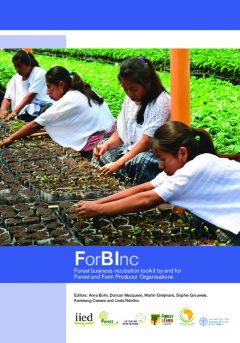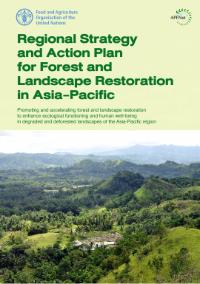Focal point
Location
The Food and Agriculture Organization of the United Nations leads international efforts to defeat hunger. Serving both developed and developing countries, FAO acts as a neutral forum where all nations meet as equals to negotiate agreements and debate policy. FAO is also a source of knowledge and information. We help developing countries and countries in transition modernize and improve agriculture, forestry and fisheries practices and ensure good nutrition for all. Since our founding in 1945, we have focused special attention on developing rural areas, home to 70 percent of the world's poor and hungry people.
Members:
Resources
Displaying 591 - 595 of 5073Forest business incubation toolkit by and for Forest and Farm Producer Organisations
This toolkit is designed to demystify the concept of business incubation as something that is not only relevant for and applied in urban sectors, but also in rural contexts and with a focus on the forest sector. The toolkit offers a framework specific to the forest and farm landscape — in which there are peculiarities of context that require special treatment.
Voluntary Guidelines on the Responsible Governance of Tenure of Land, Fisheries and Forests in the Context of National Food Security (VGGT) in Myanmar - Case study
The Voluntary Guidelines on the Responsible Governance of Tenure of Land, Fisheries and Forests in the Context of National Food Security (VGGT) promotes secure tenure rights and equitable access to land, fisheries and forests as a means of eradicating hunger and poverty, supporting sustainable development and enhancing the environment. The guidelines were officially endorsed by the Committee on World Food Security (CFS) on 11 May 2012. 2. The Guidelines serve as a reference and set of principles and internationally accepted norms or practices for the responsible governance of tenure.
Mapping opportunities for forest landscape restoration
The typical response to the loss of forest cover has been to plant trees, usually, but not always, on an industrial scale, and with a limited mix of species. Indeed, planted forests now make up 7 percent of the world’s forest area and contribute over 40 percent of the global industrial wood and fibre supply (FAO, 2010).
Namibia and FAO
FAO and Namibia have had an established partnership for more than 25 years. The most important objectives of the FAO
in Namibia are to help eliminate hunger, food insecurity and malnutrition; to make agriculture, forestry and fisheries moreproductive and sustainable; and to reduce rural poverty. In Namibia, FAO supports the Ministry of Agriculture, Water and Forestryin the development of programmes that will lead to sustainable food security, nutrition and the eradication of poverty.Regional Strategy and Action Plan for Forest and Landscape Restoration in Asia-Pacific
Degradation of forests can have severe negative local impacts and far-reaching consequences, including soil erosion, loss of biodiversity, greenhouse gas emissions, dust storms, diminished livelihood opportunities and reduced yields of forest products and services. Reversing the adverse conditions requires urgent and scaled-up action, through scientific and holistic landscape-level restoration approaches, balancing both socio-economic and environmental goals and the diverse needs of various sectors and stakeholders in the landscape.











